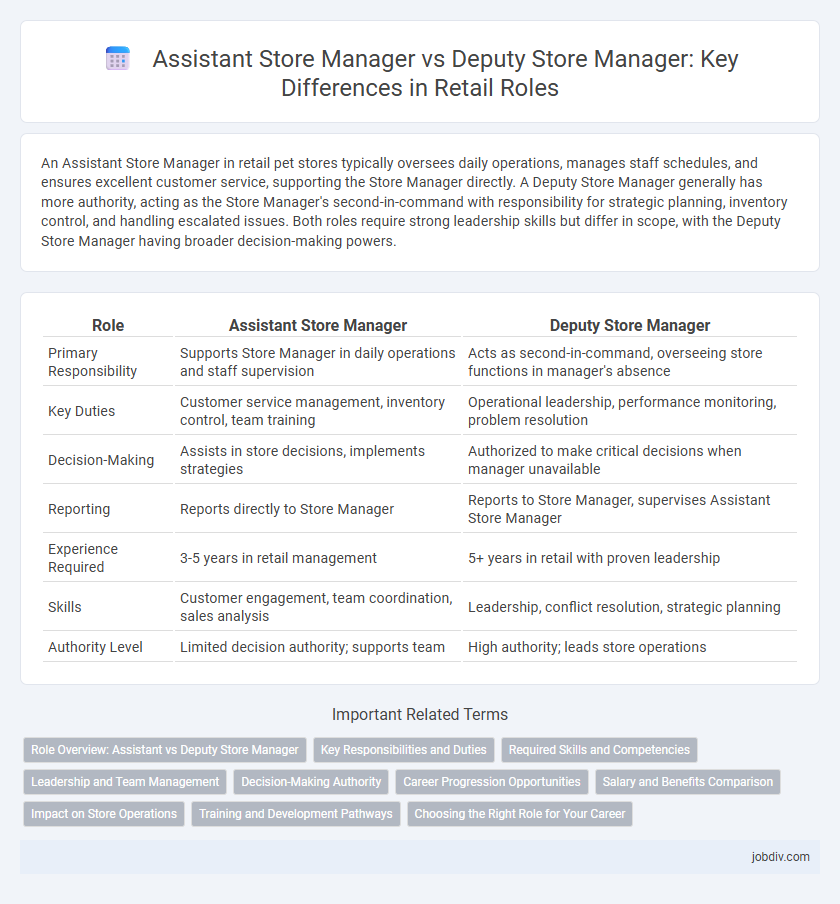An Assistant Store Manager in retail pet stores typically oversees daily operations, manages staff schedules, and ensures excellent customer service, supporting the Store Manager directly. A Deputy Store Manager generally has more authority, acting as the Store Manager's second-in-command with responsibility for strategic planning, inventory control, and handling escalated issues. Both roles require strong leadership skills but differ in scope, with the Deputy Store Manager having broader decision-making powers.
Table of Comparison
| Role | Assistant Store Manager | Deputy Store Manager |
|---|---|---|
| Primary Responsibility | Supports Store Manager in daily operations and staff supervision | Acts as second-in-command, overseeing store functions in manager's absence |
| Key Duties | Customer service management, inventory control, team training | Operational leadership, performance monitoring, problem resolution |
| Decision-Making | Assists in store decisions, implements strategies | Authorized to make critical decisions when manager unavailable |
| Reporting | Reports directly to Store Manager | Reports to Store Manager, supervises Assistant Store Manager |
| Experience Required | 3-5 years in retail management | 5+ years in retail with proven leadership |
| Skills | Customer engagement, team coordination, sales analysis | Leadership, conflict resolution, strategic planning |
| Authority Level | Limited decision authority; supports team | High authority; leads store operations |
Role Overview: Assistant vs Deputy Store Manager
The Assistant Store Manager supports daily store operations, focusing on staff supervision, customer service, and inventory management to ensure smooth functioning. The Deputy Store Manager holds a higher leadership role, responsible for implementing strategic initiatives, managing store performance metrics, and stepping in for the Store Manager when necessary. Both roles require strong organizational and communication skills but differ mainly in scope of authority and decision-making responsibilities.
Key Responsibilities and Duties
Assistant Store Managers primarily support the Store Manager in overseeing daily store operations, including staff supervision, inventory management, and customer service enhancement. Deputy Store Managers typically hold a more senior position, often stepping in for the Store Manager during absences and playing a key role in strategic planning, sales targets achievement, and operational decision-making. Both roles require strong leadership skills, but the Deputy Store Manager carries greater responsibility for overall store performance and team management.
Required Skills and Competencies
Assistant Store Managers require strong leadership skills, proficiency in inventory management, and the ability to motivate sales teams effectively. Deputy Store Managers need advanced problem-solving abilities, expertise in operational compliance, and excellent communication skills to support the Store Manager and oversee daily store functions. Both roles demand customer service excellence, financial acumen, and the capacity to handle staff scheduling and conflict resolution.
Leadership and Team Management
Assistant Store Managers oversee daily store operations, ensuring sales targets are met while directly supervising staff and addressing customer issues. Deputy Store Managers focus on leadership development, acting as a key liaison between store management and employees, and often take charge during the Store Manager's absence. Both roles require strong team management skills, but Deputy Store Managers typically handle higher-level strategic planning and staff performance evaluations.
Decision-Making Authority
Assistant Store Managers typically make operational decisions within daily store functions and handle staff scheduling, inventory management, and customer service issues. Deputy Store Managers possess broader decision-making authority, often stepping in for the Store Manager to oversee full store operations, execute strategic plans, and manage financial performance. This distinction impacts leadership roles and accountability in retail management hierarchies.
Career Progression Opportunities
Assistant Store Managers gain foundational leadership experience by supporting daily store operations and managing staff, which prepares them for advanced roles. Deputy Store Managers often hold broader responsibilities, including overseeing store performance metrics and strategic initiatives, positioning them closer to Store Manager roles. Career progression typically moves from Assistant to Deputy Store Manager, leveraging increased operational oversight and leadership skills to advance within retail management hierarchies.
Salary and Benefits Comparison
Assistant Store Manager salaries typically range from $45,000 to $60,000 annually, while Deputy Store Managers often earn between $50,000 and $65,000, reflecting their broader responsibilities. Benefits for both roles commonly include health insurance, employee discounts, and performance bonuses, with Deputy Store Managers sometimes receiving enhanced perks such as housing allowances or higher bonus potential. The salary and benefits gap underscores the increased managerial duties and decision-making authority held by Deputy Store Managers in retail operations.
Impact on Store Operations
Assistant Store Managers directly influence daily store operations by overseeing staff performance, managing inventory, and ensuring customer satisfaction. Deputy Store Managers often handle higher-level operational decisions, coordinate between departments, and support the Store Manager in strategic planning. Both roles are critical for maintaining efficient workflows, but the Deputy Store Manager typically drives broader operational improvements and cross-functional alignment.
Training and Development Pathways
Assistant Store Managers typically receive targeted leadership training and hands-on experience in daily store operations, preparing them for senior management roles. Deputy Store Managers often undergo more advanced development programs focusing on strategic planning and team leadership, bridging the gap between assistant roles and general management. Both positions emphasize continuous skill enhancement but differ in scope, with Deputy Store Managers positioned closer to executive responsibilities.
Choosing the Right Role for Your Career
Choosing between an Assistant Store Manager and Deputy Store Manager role depends on your career goals and desired responsibilities within retail management. An Assistant Store Manager typically focuses on daily operations and team supervision, while a Deputy Store Manager often assumes broader strategic duties and acts as the second-in-command to the Store Manager. Evaluate job descriptions, growth opportunities, and leadership expectations to align your choice with long-term career advancement in retail.
Assistant Store Manager vs Deputy Store Manager Infographic

 jobdiv.com
jobdiv.com